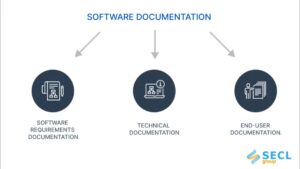In today’s fast-paced and highly competitive business environment, leveraging technology has become more critical than ever. From small startups to large corporations, companies are relying on software to streamline operations, improve efficiency, and gain a competitive edge. The right software can help businesses manage everything from customer relationships to financial records, ensuring smoother workflows and better decision-making.
This article will explore the various types of software used by businesses, how they impact operations, and the benefits they bring. Whether you’re a small business owner or a decision-maker in a large enterprise, understanding the different software options available can help you make more informed choices for your business.
Types of Business Software
- Enterprise Resource Planning (ERP) SoftwareERP software integrates various business functions such as inventory management, finance, procurement, human resources, and more into a single platform. This comprehensive software solution allows businesses to centralize data, ensuring that different departments can access and update information in real-time. ERPs are particularly useful for large enterprises with complex operations, where coordination between multiple teams is essential.Popular ERP systems include SAP, Oracle, and Microsoft Dynamics. These solutions enable organizations to optimize business processes, reduce redundancy, and improve overall productivity.
- Customer Relationship Management (CRM) SoftwareCRM software helps businesses manage and analyze interactions with current and potential customers. By centralizing customer data such as contact information, purchase history, and customer preferences, CRM systems enable businesses to enhance customer service, tailor marketing efforts, and improve sales processes.Leading CRM platforms like Salesforce, HubSpot, and Zoho CRM offer features such as sales pipeline tracking, customer support ticketing, and automated follow-ups, making it easier for businesses to build and maintain strong relationships with their customers.
- Accounting SoftwareKeeping track of finances is crucial for any business, regardless of size. Accounting software simplifies financial management by automating tasks such as invoicing, payroll, expense tracking, and tax preparation. This helps ensure accuracy in financial reporting and compliance with legal regulations.Widely used accounting software solutions include QuickBooks, Xero, and FreshBooks. These programs help businesses maintain a clear financial picture, allowing for better budgeting, financial forecasting, and cash flow management.
- Project Management SoftwareProject management software allows teams to plan, execute, and track projects from inception to completion. With features such as task assignment, time tracking, Gantt charts, and collaboration tools, project management software makes it easier for teams to stay organized and meet deadlines.Tools like Asana, Trello, and Monday.com are popular choices, providing an easy-to-use interface and real-time updates on project progress. Businesses that rely on project-based work, such as marketing agencies, IT firms, and construction companies, often find these tools invaluable for managing both small and large-scale projects.
- Human Resource Management (HRM) SoftwareHRM software helps businesses manage their workforce more effectively. From recruiting and onboarding to performance evaluations and payroll, HRM systems streamline all aspects of human resource management. This allows HR departments to focus more on strategic initiatives rather than administrative tasks.Popular HRM software includes BambooHR, Workday, and ADP. These platforms offer features such as employee self-service portals, attendance tracking, and benefits administration, which simplify HR processes and improve employee engagement.
- Collaboration SoftwareWith the rise of remote work and distributed teams, collaboration software has become an essential tool for modern businesses. These platforms allow teams to communicate, share files, and work together in real-time, regardless of location.Slack, Microsoft Teams, and Zoom are among the top collaboration tools used today. They offer instant messaging, video conferencing, and file sharing, fostering seamless communication and collaboration across teams, whether they’re working from home or across different continents.
- Marketing Automation SoftwareMarketing automation software allows businesses to automate repetitive marketing tasks such as email campaigns, social media posting, and lead nurturing. By using data and analytics, these tools help businesses personalize their marketing efforts, ensuring that the right message reaches the right audience at the right time.HubSpot, Marketo, and Mailchimp are popular marketing automation tools that help businesses improve the efficiency and effectiveness of their marketing strategies. By automating routine tasks, businesses can free up time for more creative and strategic initiatives.
The Impact of Business Software
Business software has revolutionized the way companies operate, bringing about significant benefits such as:
1. Increased Efficiency
Automation of routine tasks allows businesses to reduce the time and effort spent on manual processes. For example, accounting software can automatically generate financial reports, while project management tools can send reminders for upcoming deadlines. This not only saves time but also reduces the likelihood of errors.
2. Improved Decision-Making
Many business software platforms come with built-in analytics and reporting tools. These provide valuable insights into business performance, customer behavior, and financial health. Access to real-time data enables business leaders to make more informed, data-driven decisions.
3. Cost Savings
While investing in business software can involve an upfront cost, it often leads to significant long-term savings. Automation reduces the need for manual labor, while improved efficiency and productivity translate to cost savings. For example, businesses can reduce errors and wastage, leading to lower operational costs.
4. Enhanced Customer Satisfaction
Software solutions such as CRM and marketing automation help businesses deliver more personalized and timely service to their customers. This results in higher customer satisfaction and improved customer retention. Additionally, tools like customer support software ensure that issues are resolved quickly and efficiently.
5. Scalability
As businesses grow, so do their operational needs. Business software is typically designed to be scalable, allowing companies to add new features and users as needed. This flexibility ensures that businesses can continue to operate smoothly as they expand.
Challenges in Implementing Business Software
While business software offers numerous benefits, it is not without challenges. Some of the common issues businesses face when implementing software include:
1. High Initial Costs
For small businesses, the cost of implementing a full-scale ERP or CRM system can be daunting. However, cloud-based solutions often offer more affordable, subscription-based pricing, making them more accessible to smaller enterprises.
2. Training and Adoption
Implementing new software often requires training employees to use the system effectively. This can take time and may lead to a temporary dip in productivity as employees adjust to new workflows.
3. Integration Issues
Businesses may use multiple software platforms that need to integrate with each other. In some cases, systems may not be fully compatible, leading to data silos and inefficiencies. It’s important to choose software that can easily integrate with your existing tools.
4. Security Risks
As businesses store sensitive data in software platforms, security becomes a critical concern. Cyberattacks, data breaches, and unauthorized access can have serious consequences. Businesses must invest in robust security measures to protect their data and comply with industry regulations.
FAQs
1. What is the most important software for a small business?
The most important software for a small business typically includes accounting software (such as QuickBooks), a CRM system (such as HubSpot), and project management tools (such as Trello). These solutions help small businesses manage their finances, build customer relationships, and streamline operations.
2. How can business software improve efficiency?
Business software automates routine tasks, reducing the time spent on manual processes. This allows employees to focus on more strategic initiatives, improving overall productivity. Software such as ERPs and CRMs also provide real-time data, allowing for faster decision-making and smoother workflows.
3. What should I consider when choosing business software?
When choosing business software, consider factors such as scalability, ease of use, cost, and integration with your existing tools. It’s also important to evaluate the specific needs of your business, such as whether you need software for accounting, project management, or customer relationship management.
4. Is cloud-based software better for businesses?
Cloud-based software offers several advantages, including lower upfront costs, accessibility from anywhere with an internet connection, and easier scalability. However, it also comes with potential security concerns, so it’s important to ensure that the software provider has robust security measures in place.
5. What are the risks of not using business software?
Not using business software can lead to inefficiencies, errors, and a lack of organization. Manual processes are prone to mistakes, and without software to manage tasks such as accounting or customer relationships, businesses may find it difficult to stay competitive in the market.
Conclusion
In the modern business landscape, leveraging the right software is key to staying competitive. From ERPs and CRMs to accounting and project management tools, software solutions can help businesses of all sizes improve efficiency, reduce costs, and make better decisions. While there may be challenges in implementation, the long-term benefits far outweigh the initial investment. Whether you’re a small business owner or part of a large corporation, the right software can empower your business to thrive in today’s digital age.



